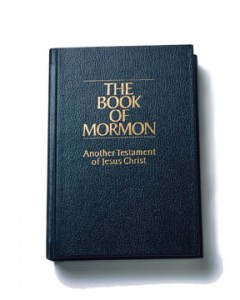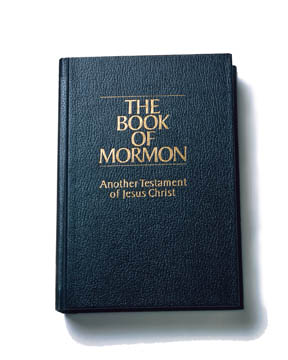I’ll never forget a particular woman I met while serving as a missionary for the Mormon Church of Jesus Christ of Latter-day Saints, known as the Mormons, in Portugal. She was a Jehovah’s Witness, but was dissatisfied with some of the rules of that faith. My missionary companion (this was before I was assigned to work with him) was in her neighborhood and knocked on her door.
 She let him in, and they had a nice talk. In the process of the meeting, my companion showed her this passage from the Book of Mormon:
She let him in, and they had a nice talk. In the process of the meeting, my companion showed her this passage from the Book of Mormon:
“Behold, God is my salvation; I will trust, and not be afraid; for the Lord JEHOVAH is my strength and my song; he also has become my salvation.” (2 Nephi 22:2)
She got excited by seeing that we also believed in Jehovah. She was hooked. And the rest is history.
Joseph Smith, the first prophet of the Mormon Church, revealed Jehovah’s identity. On April 3, 1836, he and Oliver Cowdery were attending church meetings in the Kirtland, Ohio temple. They had just finished building the temple and had dedicated it a week earlier. After they administered the sacrament (communion, or the Lord’s Supper), they began to pray. After finishing they had this vision of Jehovah:
“The veil was taken from our minds, and the eyes of our understanding were opened.”
“We saw the Lord standing upon the breastwork of the pulpit, before us; and under his feet was a paved work of pure gold, in color like amber.”
“His eyes were as a flame of fire; the hair of his head was white like the pure snow; his countenance shone above the brightness of the sun; and his voice was as the sound of the rushing of great waters, even the voice of Jehovah, saying:”
“I am the first and the last; I am he who liveth, I am he who was slain; I am your advocate with the Father.”
“Behold, your sins are forgiven you; you are clean before me; therefore, lift up your heads and rejoice.”
“Let the hearts of your brethren rejoice, and let the hearts of all my people rejoice, who have, with their might, built this house to my name.”
“For behold, I have accepted this house, and my name shall be here; and I will manifest myself to my people in mercy in this house.”
“Yea, I will appear unto my servants, and speak unto them with mine own voice, if my people will keep my commandments, and do not pollute this holy house.”
“Yea the hearts of thousands and tens of thousands shall greatly rejoice in consequence of the blessings which shall be poured out, and the endowment with which my servants have been endowed in this house.”
“And the fame of this house shall spread to foreign lands; and this is the beginning of the blessing which shall be poured out upon the heads of my people. Even so. Amen.” (D&C 110:1-10)
The person who appeared to Joseph Smith and Oliver Cowdery identified Himself as Jehovah. He then described Himself using these words:
• “I am the first and the last”
• “I am he who liveth, I am he who was slain”
• “I am your advocate with the Father.”
These titles indicate that this personage was none other than Jesus Christ. This explains why He forgave Joseph Smith’s and Oliver Cowdery’s sins: Jesus Christ is in the business of forgiving people who really repent.
This is why Mormons believe that Jehovah is Jesus Christ. Of course these names can be confusing, so In 1916 the leaders of the Mormon Church wrote a document that outlined the relationship between God and Jesus, Elohim and Jehovah. (Click here for an online edition of this document.)
Yes, it can be confusing, but we should remember that God goes by many names: Wonderful, Counselor, The mighty God, The everlasting Father, The Prince of Peace (Isaiah 9:6). Each one of these titles highlights an aspect of God’s character. Jehovah means “I AM” or “The Unchangeable One,” and is the name He used before He was born.
Jehovah was the name He went by in the Old Testament, which was the era of the great temples. Since Joseph Smith was restoring temples in this era of earth’s history, it is not surprising that Christ used His old name to highlight the connection to the Old Testament.
For me, it is important to know who God is and who His Son is. And knowing the names of God—be it Christ or Jehovah—is a key to understanding who He is.


